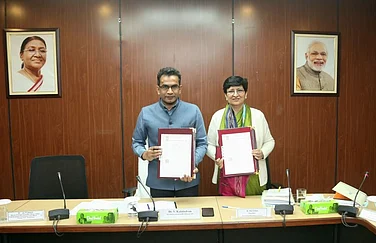In a groundbreaking advance that could transform diabetes management and prevention, Indian researchers have identified hidden blood biomarkers that offer critical insights into the early detection of diabetic kidney disease (DKD) also known as diabetic nephropathy.
The discovery by the researchers from the Indian Institute of Technology (IIT) Bombay, in collaboration with Osmania Medical College and Clarity Bio Systems India, holds immense promise for revolutionizing diagnostic methods and paving the way for personalized treatment strategies for millions living with diabetes.
India is home to more than 101 million adults with diabetes. An additional 136 million at risk, faces an escalating public health challenge. Most cases are detected only after the onset of serious complications—particularly kidney failure, one of the most common and debilitating outcomes of uncontrolled diabetes. Early and precise identification of risk factors has therefore become a crucial medical priority.
Led by Professor Pramod Wangikar from the Department of Chemical Engineering at IIT Bombay, the research team employed advanced metabolomics—a cutting-edge analytical approach that studies small molecules (metabolites) in biological samples—to map subtle biochemical changes in blood. These changes, the study found, can signal the onset of diabetic kidney disease well before traditional tests detect any damage.
By comparing blood samples of diabetic patients with those of healthy individuals, the researchers uncovered distinct metabolic signatures that differentiate those at higher risk of developing kidney complications. The findings could help doctors move beyond the conventional one-size-fits-all approach and instead design tailored therapeutic and preventive interventions based on individual metabolic profiles.
“This research represents a significant step toward predictive and precision medicine for diabetes,” said a member of the research team. “Understanding these early biomarkers enables clinicians to intervene much sooner, potentially delaying or even preventing irreversible kidney damage.”
As India continues to grapple with an alarming rise in metabolic disorders, the innovation marks a critical step toward strengthening preventive healthcare and reducing the national disease burden.
Diabetic kidney disease results from long-term damage to the small blood vessels in the kidneys due to uncontrolled high blood sugar levels. In its early stages, the condition often progresses silently, showing little to no symptoms. As it advances, however, patients may experience swelling in the legs or feet, foamy urine, fatigue, and elevated blood pressure.
Diagnosis is typically made through urine and blood tests that assess kidney function and detect the presence of proteins such as albumin. Effective management focuses on maintaining optimal blood sugar and blood pressure levels, alongside lifestyle modifications including a balanced diet, regular exercise, and avoiding smoking. "Early detection and intervention can significantly slow the progression of kidney damage and improve long-term outcomes for individuals living with diabetes," according to medical experts.























